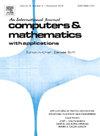Adaptive fast L1 − 2 scheme for solving time fractional parabolic problems
IF 2.9
2区 数学
Q1 MATHEMATICS, APPLIED
引用次数: 0
Abstract
In this paper, we study a posteriori error estimates of the fast scheme for time discretization of time fractional parabolic differential equations. To overcome the huge workload caused by the nonlocality of fractional derivative, a fast algorithm is applied to the construction of the scheme. Employing the numerical solution obtained by the fast scheme, a piecewise continuous function approximating the exact solution is constructed. Then, by exploring the error equations, a posteriori error estimates are obtained in different norms, which depend only on the discretization parameters and the data of the problems. Various numerical experiments for the fractional parabolic equations with smooth or nonsmooth exact solutions on different time meshes, including the frequently-used graded mesh, are carried out to verify and complement our theoretical results. Based on the obtained a posteriori error estimates, a time adaptive algorithm is proposed to reduce the computational cost substantially and provides efficient error control for the solution.
自适应快速L1 − 2方案解决时间分数抛物线问题
本文研究了时间分数阶抛物型微分方程时间离散化的快速L1−2格式的后先验误差估计。为了克服分数阶导数的非局域性所带来的巨大工作量,采用了一种快速的算法来构造L1−2格式。利用快速L1−2格式得到的数值解,构造了一个近似精确解的分段连续函数。然后,通过对误差方程的研究,得到不同范数下的后验误差估计,该估计只依赖于问题的离散化参数和数据。对分数阶抛物方程在不同时间网格(包括常用的梯度网格)上的光滑或非光滑精确解进行了各种数值实验,以验证和补充我们的理论结果。在得到后验误差估计的基础上,提出了一种时间自适应算法,大大减少了计算量,并为解提供了有效的误差控制。
本文章由计算机程序翻译,如有差异,请以英文原文为准。
求助全文
约1分钟内获得全文
求助全文
来源期刊

Computers & Mathematics with Applications
工程技术-计算机:跨学科应用
CiteScore
5.10
自引率
10.30%
发文量
396
审稿时长
9.9 weeks
期刊介绍:
Computers & Mathematics with Applications provides a medium of exchange for those engaged in fields contributing to building successful simulations for science and engineering using Partial Differential Equations (PDEs).
 求助内容:
求助内容: 应助结果提醒方式:
应助结果提醒方式:


